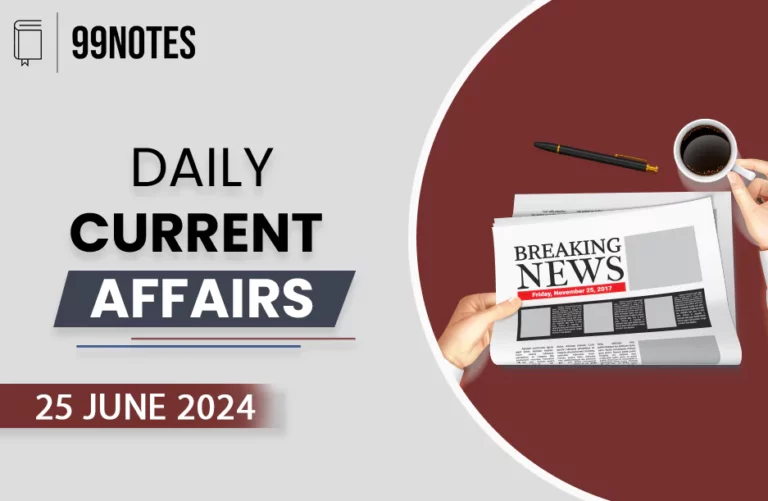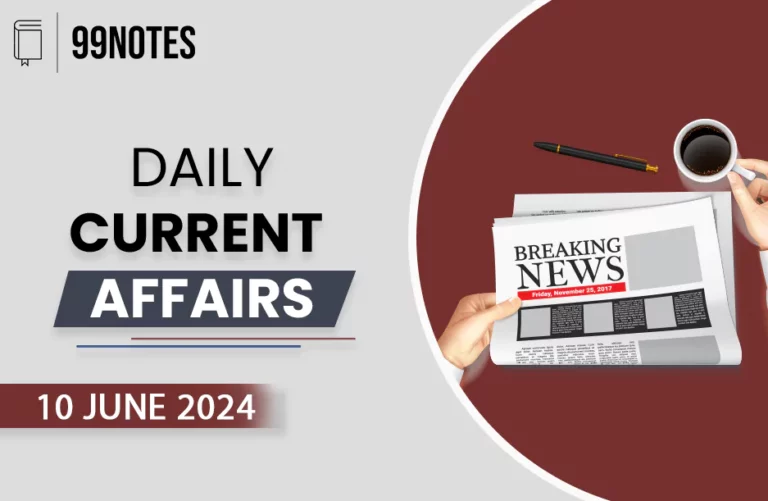17 May 2023 : Daily Current Affairs
Daily Current Affairs
17-May-2023
Daily Current Affairs For UPSC ,Daily Current affairs of The hIndu and Indian Express.
1. Monsoon to set in over Kerala on June 4: IMD
Topic: GS1 – Indian geography.
Previous Year Questions on Monsoon:
-
What characteristics can be assigned to the monsoon climate that succeeds in feeding more than 50 percent of the world population residing in Monsoon Asia? (GS 1: 2017)
-
How far do you agree that the behaviour of the Indian monsoon has been changing due to humanizing landscapes? Discuss. (GS 1: 2015)
Context:
-
-
-
The onset of the monsoon over Kerala is likely to be slightly delayed to June 4, according to the India Meteorological Department (IMD).
-
The usual onset date for the monsoon over Kerala is June 1, with a seven-day window.
-
-
Issue:
-
-
-
The IMD has forecasted a “normal” monsoon for the June-September season, with rainfall expected to be 96% of the Long Period Average (LPA).
-
The LPA represents the average monsoon rainfall over India, which is 89 cm.
-
The development of an El Nino in the Central Pacific is expected to contribute to diminished rainfall this year.
-
-
Different timelines of monsoons in Indian states:
-
-
-
Kerala: The southwest monsoon usually arrives in Kerala around the first week of June and covers the entire state by mid-June.
-
Karnataka: Monsoon onset in Karnataka occurs in early to mid-June, with most parts of the state receiving rainfall by the end of June.
-
Maharashtra: Monsoon reaches Maharashtra in the first half of June, with most regions experiencing rainfall by late June or early July.
-
Gujarat: The southwest monsoon reaches Gujarat by mid-June, covering the entire state by the end of June or early July.
-
Rajasthan: Monsoon arrives in Rajasthan by the end of June or early July, gradually covering the entire state in the following weeks.
-
Uttar Pradesh: Monsoon onset in Uttar Pradesh is typically in late June or early July, with most regions receiving rainfall by July.
-
Bihar: Bihar experiences monsoon onset in late June or early July, with widespread rainfall occurring in July.
-
West Bengal: Monsoon usually arrives in West Bengal by the end of June or early July, bringing significant rainfall to the state.
-
Assam: Monsoon reaches Assam in late June or early July, leading to heavy rainfall in the region.
-
-
Impact of El Niño on Indian Monsoon:
El Niño is a climatic phenomenon characterized by the warming of sea surface temperatures in the central and eastern equatorial Pacific Ocean. It can have a significant impact on the Indian monsoon, leading to below-average rainfall and affecting agricultural activities, water availability, and overall economic conditions. Here are the impacts of El Niño on the Indian monsoon:
-
-
-
Below-average rainfall: During El Niño years, the Indian monsoon rainfall tends to be below normal. The warming of the Pacific Ocean disrupts the atmospheric circulation patterns, weakening the monsoon winds and reducing the moisture transport over the Indian subcontinent. This results in decreased rainfall and dry conditions in many parts of the country.
-
Drought conditions: El Niño events are often associated with drought conditions in India. Insufficient rainfall can lead to water scarcity, affecting agriculture, livestock, and overall food production. Droughts can also impact rural livelihoods, increase food prices, and pose challenges for water management and availability.
-
Crop failure and agricultural losses: Inadequate rainfall during El Niño can lead to crop failures and reduced agricultural yields. Insufficient water availability for irrigation and moisture stress on crops can result in reduced agricultural productivity, affecting farmers’ incomes and the country’s food security.
-
Impact on hydroelectric power generation: Reduced rainfall and water flow in rivers during El Niño can affect hydroelectric power generation. Insufficient water reserves in dams and reservoirs can lead to decreased power generation capacity, impacting the energy sector and overall electricity supply.
-
Economic implications: The Indian economy can be affected by the impacts of El Niño on the monsoon. Reduced agricultural output, increased food prices, and challenges in the energy sector can have broader economic implications, including inflationary pressures, reduced rural incomes, and lower overall economic growth.
-
-
Reference: Geography – 11th NCERT, Geography of India – Majid Hussain.
2. Why spurious liquor kills.
Topic: GS2 – Health
Context:
-
-
-
22 people have died, and more than 30 others are being treated in hospitals after consuming spurious liquor in Chengalpattu and Villupuram districts of Tamil Nadu.
-
-
Issue:
-
-
-
The World Health Organization (WHO) states that “no level of [alcohol] consumption is safe for our health.” Long-term use of alcohol can lead to dependence, increase the risk of certain cancers and heart disease, and may eventually cause death.
-
Ethanol, the alcohol found in beverages, is metabolized in the body by enzymes into acetaldehyde, which is responsible for the adverse effects of alcohol consumption, including hangovers and potential health risks.
-
Spurious liquor is characterized by the presence of methanol, which is an industrial-grade alcohol. Methanol is highly toxic and can lead to severe health consequences when ingested.
-
Methanol is metabolized in the liver into formaldehyde and then further converted into formic acid. The accumulation of formic acid can cause metabolic acidosis, a condition where the blood becomes increasingly acidic. It can also lead to methanol-induced optic neuropathy, which can result in long-term or irreversible visual impairment.
-
Methanol poisoning can also cause cerebral oedema, haemorrhage, and death.
-
-
3. Not violating sanctions on Russian oil, says Centre after EU Minister’s charge.
Topic: GS2 – International Relations, GS 3 – Economy
Context:
-
-
-
European Union’s Foreign Minister, Josep Borrell, stated that Europe should not allow the entry of refined petroleum products from India made from Russian oil.
-
-
Issue:
-
-
-
The Indian government denied violating sanctions and argued that it is challenging to determine the origins of petroleum products sold in Europe.
-
Indian External Affairs Minister S. Jaishankar countered the claim, stating that Russian crude if significantly transformed in a third country, is no longer considered Russian under EU Council Regulation.
-
Borrell’s remarks were made in an interview with the Financial Times, where he mentioned that Indian refiners were purchasing Russian crude oil and processing it into fuels for sale in Europe.
-
Borrell considered this a circumvention of sanctions and called for action by EU member states.
-
The Indian government dismissed the charge of circumventing sanctions, stating that it has no knowledge of such sales and that they are conducted by private entities and oil refineries.
-
Earlier, the Indian Petroleum and Natural Gas Ministry strongly refuted a think tank’s report alleging India’s involvement in buying Russian oil and selling refined products to European countries.
-
-
4. Collegium recommends A.P. Chief Justice, senior advocate as SC judges.
Topic: GS2 – Judiciary
Context:
-
-
-
The Supreme Court Collegium has recommended the appointment of senior advocate K.V. Viswanathan as a judge of the Supreme Court.
-
The Collegium has also proposed the appointment of Andhra Pradesh Chief Justice Prashant Kumar Mishra as a Supreme Court judge.
-
-
Issue:
Collegium system for Supreme Court judge’s appointment:
-
-
-
Composition: The Supreme Court collegium consists of the Chief Justice of India and four senior-most judges of the Supreme Court. The collegium for high court appointments is composed of the Chief Justice of the respective high court and two senior-most judges.
-
Appointment Process: When there is a vacancy in the Supreme Court or a high court, the collegium recommends suitable candidates for appointment or transfer to the respective positions. The recommendations are made based on the judges’ seniority, merit, and suitability.
-
Consultation: The collegium system involves a process of consultation among its members. They discuss and evaluate the credentials and suitability of candidates for judicial appointments or transfers. The collegium’s decisions are typically taken by a majority vote.
-
Government Consultation: After the collegium makes its recommendations, the names are forwarded to the government for consideration. The government is required to provide its opinion on the recommendations but is bound by the collegium’s decision. In case of a disagreement, the collegium’s decision prevails.
-
Transparency: The collegium system has faced criticism for its lack of transparency. The process of decision-making and selection criteria are not publicly disclosed, which has raised concerns about accountability and potential biases.
-
Judicial Independence: Proponents of the collegium system argue that it helps protect judicial independence by ensuring that the judiciary has a significant say in judicial appointments. They believe that involving the judiciary in the appointment process prevents undue influence from the executive branch.
-
Criticisms: Critics of the collegium system argue that it lacks transparency and accountability. They believe that the process should involve a more diverse set of stakeholders, including the government and legal experts, to ensure a fair and merit-based selection of judges.
-
-
Reference: Indian polity – M. Laxmikant.
5. Centre rejects U.S. govt. report citing deteriorating religious freedom in India.
Topic: GS1 – Society, GS2 – IR.
Context:
-
-
-
The Ministry of External Affairs (MEA) of India rejected the U.S. government’s latest “Report on International Religious Freedom” and called it based on misinformation and flawed understanding.
-
-
Issue:
-
-
-
The MEA stated that the statements in the report by U.S. officials were motivated and criticized their commentary as biased.
-
The U.S. report highlighted alleged cases of violence against Christians, Muslims, and Dalits in India, as well as criticized Indian anti-conversion laws.
-
The report also mentioned complaints from Hindus in Kashmir regarding restrictions on leaving the valley due to threats from radical Islamist terrorists.
-
The report documented instances of hate speech and violence attributed to members of the ruling Bharatiya Janata Party (BJP) and others.
-
The MEA emphasized that India values its partnership with the United States and will continue to have frank exchanges, despite rejecting the report.
-
The U.S. report comes ahead of Prime Minister Narendra Modi’s state visit to Washington in June, where he will meet with U.S. President Joseph Biden.
-
-
6. NHRC flags rise in child abuse content on social media
Topic: GS1 – Society, GS3 – Cyber security and Social Media
Context:
-
-
-
The NHRC has taken suo motu cognizance of a media report on the increase in circulation of child sexual abuse material (CSAM) on social media in India.
-
The NHRC noted that the content is of foreign origin, and no Indian-made CSAM has been found so far by Indian investigation agencies.
-
-
Issue:
About National Human Rights Commission (NHRC):
The National Human Rights Commission (NHRC) is an autonomous body in India that is responsible for the promotion and protection of human rights in the country. It was established in 1993 under the Protection of Human Rights Act.
Key points about the NHRC:
-
-
-
Mandate: The NHRC’s primary mandate is to ensure the protection and promotion of human rights, as enshrined in the Constitution of India and various international human rights instruments.
-
Composition: The NHRC consists of a Chairperson and members appointed by the President of India. The Chairperson is a retired Chief Justice of the Supreme Court of India.
-
Functions: The NHRC has several functions, including investigating complaints of human rights violations, conducting inquiries, promoting human rights awareness, and recommending measures to prevent human rights violations.
-
Powers: The NHRC has the powers of a civil court, such as the ability to summon witnesses, examine documents, and issue orders for the production of records. However, its recommendations are not binding, but they hold significant moral and persuasive value.
-
Jurisdiction: The NHRC can investigate human rights violations committed by both government and non-government entities. It has jurisdiction over the entire territory of India, including union territories.
-
Reports and Recommendations: The NHRC submits annual and special reports to the government, highlighting human rights issues and making recommendations for improvement. It can also intervene in court proceedings related to human rights violations.
-
State Human Rights Commissions: The NHRC can recommend the establishment of State Human Rights Commissions (SHRCs) in states to promote and protect human rights at the state level. SHRCs have similar functions as the NHRC within their respective states.
-
-
National Commission for Protection of Child Rights (NCPCR):
National Commission for Protection of Child Rights (NCPCR), which is a statutory body responsible for the protection and promotion of children’s rights in the country.
Key points about the National Commission for Protection of Child Rights (NCPCR):
-
-
-
Establishment: The NCPCR was established in 2007 under the Commissions for Protection of Child Rights (CPCR) Act, 2005.
-
Mandate: The NCPCR’s primary mandate is to ensure that all laws, policies, programs, and administrative mechanisms are in consonance with the rights of the child as enshrined in the Constitution of India and international conventions.
-
Functions: The NCPCR has several functions, including monitoring the implementation of child rights, inquiring into complaints and taking suo motu cognizance of child rights violations, conducting research and studies, and promoting child-friendly practices.
-
Powers: The NCPCR has the powers of a civil court, such as the ability to summon witnesses, examine documents, and issue orders for the production of records. However, its recommendations are not binding, but they hold significant moral and persuasive value.
-
Jurisdiction: The NCPCR has jurisdiction over the entire territory of India and can investigate child rights violations committed by both government and non-government entities.
-
Reports and Recommendations: The NCPCR submits annual and special reports to the government, highlighting child rights issues and making recommendations for improvement. It also provides advice and recommendations on various policy and legislative matters related to children.
-
-
Reference: Indian polity – M. Laxmikant., https://vikaspedia.in/education/child-rights/national-commission-for-protection-of-child-rights-ncpcr.
For Enquiry

17 May 2023 : Daily Current Affairs

16 May 2023 : PIB

16 May 2023 : The Hindu Editorial

16 May 2023 : Daily Current Affairs

Social Infrastructure

15 May 2023 : The Hindu Editorial

15 May 2023 : PIB

15 May 2023 : Daily Current Affairs

Kurukshetra Summary April 2023 : Panchayati Raj

13 May 2023 : PIB
Daily Current Affairs 17 May 2023 : Daily Current Affairs Daily Current Affairs
17-May-2023
Daily Current Affairs For UPSC ,Daily Current affairs of The hIndu…
PIB 16 May 2023 : PIB Press Information Bureau
16-May-2023
Daily Current Affairs For UPSC ,The PIB ( Press Information Bureau…
The Hindu 16 May 2023 : The Hindu Editorial The Hindu Editorial
16-May-2023
Daily Current Affairs For UPSC ,The Hindu Editorial Summary
Facebook-f
Twitter
Youtube
1….
Daily Current Affairs 16 May 2023 : Daily Current Affairs Daily Current Affairs
16-May-2023
Daily Current Affairs For UPSC ,Daily Current affairs of The hIndu…
Infrastructure Social Infrastructure Social Infrastructure refers to creating and maintaining facilities and structures that support the delivery…
The Hindu 15 May 2023 : The Hindu Editorial The Hindu Editorial
15-May-2023
Daily Current Affairs For UPSC ,The Hindu Editorial Summary
Facebook-f
Twitter
Youtube
1….
PIB 15 May 2023 : PIB Press Information Bureau
15-May-2023
Daily Current Affairs For UPSC ,The PIB ( Press Information Bureau…
Current Affairs 15 May 2023 : Daily Current Affairs Daily Current Affairs
15-May-2023
Daily Current Affairs For UPSC ,Daily Current affairs of The hIndu…
kurukshetra summary Kurukshetra Summary April 2023 : Panchayati Raj Chapter 1: Empowering Panchayati Raj Institutions:
Panchayat Raj institutions (PRIs) are pillars of…
Uncategorized 13 May 2023 : PIB Press Information Bureau
13-May-2023
Daily Current Affairs For UPSC ,The PIB ( Press Information Bureau…






